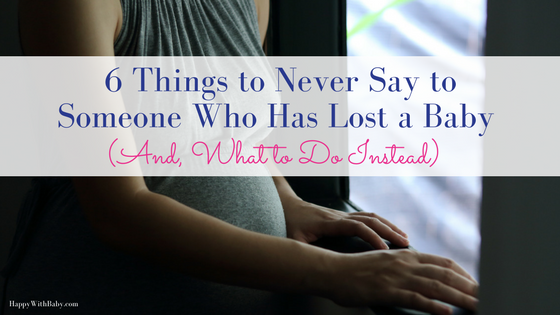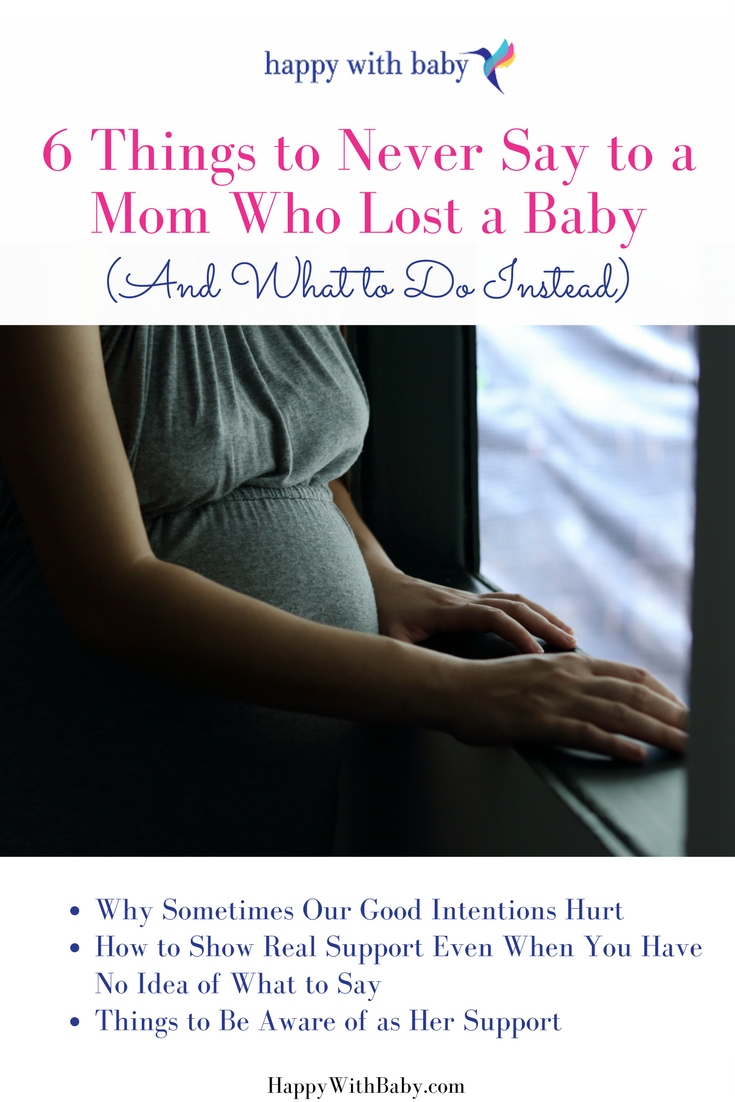6 Things to Never Say to Someone Who Has Lost a Baby (And What to Do Instead)
Trigger Warning:
This post deals with the common experiences and needs of moms who have lost a baby. If you have experienced a miscarriage or baby loss and the grief feels too raw for you right now, please honor how you’re feeling today and consider bookmarking this post for another day when you’re feeling stronger or more ready.

Last week, in honor of Pregnancy and Infant Loss Awareness Month, I wrote about some of the common threads experienced by moms who have miscarried or lost a baby.
This week, I want to talk about how to be a support to these moms.
Because I think we often struggle with how to support someone who has lost a loved one in general, and when someone who has lost a baby it can seem almost not real to the people in her periphery.
But even when our intentions are good, we can sometimes slip up and say the wrong thing in our attempts to be supportive. And when that happens, we can cause mom even more pain.
With a little bit of pause and extra thought, we can avoid some of those well-intended, hurtful statements. Let’s go over some of the biggest offenders:
“Everything happens for a reason.” Or, “It must be God’s will.”
Anything that proclaims that it was destined to be this way bypasses their pain or suggests that they deserved for this to happen. Even if they do believe that it was in fact God’s will or that it happened for good reason, they are still allowed to own their grief.
“At least you can get pregnant.” Or, “At least you already have other kids.”
Let’s just avoid anything that starts with “At least….”. I promise you, every mom who has experienced baby loss already knows what they can be grateful for in their life. These things don’t feel like consolation when all you can think about is the baby that is no longer there. Imagine if you lost any other loved one--your partner, your best friend, or one of your parents--and someone said to you, “Well, at least you have a great dog and your dad is still around.” Would that make you miss your partner, your friend, or your mom less?
“Maybe this just wasn’t the right time.”
This is the cousin of “Everything happens for a reason.” There’s a certain amount of happenstance or destiny implied in this statement, which undermines their grief. Also, it can come across as victim-blaming. Like, maybe if they weren’t so stressed trying to sell their house and change jobs all while being pregnant, (or a different partner or a stronger body...) maybe it would have worked out. Trust me, mom already feels guilty enough, that somehow it is her fault she couldn’t keep her baby alive regardless of the circumstances.

“Well, you better try again soon. It only gets harder the older you get.”
Nothing like adding insult to injury. Not only does this statement tell mom to get over it quickly and move on, but it also tells her that she’s waited too long (victim-blaming) and her body is past its shelf-life or is malfunctioning (which can feel self-sabotaging). It suggests that it just might not be in the cards for her if she doesn’t do this right.
“You’ve got plenty of time to try again. You’ll have your chance.”
This one is related to the other ageist comment above. Just try to keep the clock out of it altogether. No one knows for sure what can or will happen, so it’s silly to pretend. Also, this kind of statement doesn’t honor the baby they’ve lost at all. This isn’t like fishing or bobbing for apples, where if you don’t catch one the first time, another one will come along if you just wait patiently or keep at it. All the possible future babies don’t make up for the one you don’t have.
“I understand how you feel.”
If you’ve never miscarried or lost a baby before, definitely don’t say this. But even if you have, it’s probably better to avoid this one too. Because everyone’s grief looks totally different. And a lot of it can depend on at what point in their pregnancy or postpartum they were in when the loss happened. She might be miscarrying and only just now found out she was pregnant. She may have needed a medical procedure to remove the baby or had to deliver the baby stillborn. She may have not even had time to connect with her pregnancy or she might have spent hours watching her premie through plexiglass. Every mother’s story is her own, and so is her grief. Let her own it.
A good rule of thumb here is if you’re wondering at all whether what you’re going to say might be hurtful, just don’t say it. Better to say nothing and just hold space.
Now, you’re probably wondering how in the world to be a good friend to them when it seems like there are so many hurtful ways to accidentally do it wrong. Don’t worry. I have some suggestions for you.
Don’t ghost on her. Be present.
I think we as a culture are so programmed to not acknowledge feelings in general. And when someone is having some pretty big ones, it’s easy to discount them because we don’t know what else to do. But all she really needs from you is to not feel alone. I’m not asking that you give of yourself what might not be in you to give. Just don’t totally disappear on your friend or loved one when they’re going through this. Write, text, call, visit. Share a hug or a cup of tea. Hold her hand. Listen. Or, if you don’t know what else to do, at least send her one of these cards. You don’t necessarily have to say anything. Just show her, “I am here for you.”
(And continue to do this even after you’ve all but forgotten about it, because she hasn’t forgotten.)
Call the baby by his or her name.
Or at least refer to “it” as “baby” (and not “it” or “the fetus”). To your mom friend, this was her baby. It had--HAS--an identity. Honor who this baby was to her.
Say what you know for sure: that you’re sorry, that you don’t know why this happened, that she can grieve any way she needs to, and that you are here for her.
Those are the only things you need to say. And if those don’t feel appropriate, just let your presence speak for you. Words aren’t always necessary.
Ask her what she needs from you.
It’s such a simple question, but so easily overlooked: “What do you need?” Ask how you can best support her. She might need to talk about it or she might not want to talk about it at all. She might ask you to text her just to check in every day or she might need help dealing with tasks, like making important phone calls. She might want to get all baby items out of sight right away or she might want to keep everything around to feel closer to her baby. (Again, everyone grieves differently.) It’s best to not assume to know what she needs to hear or what she needs you to do. Just ask her.
Have at least some awareness of when Postpartum Depression might be a risk and watch her for it.
Something that isn’t often thought of or talked about is that postpartum depression is a risk for anyone who has been pregnant, regardless of whether the pregnancy resulted in a healthy baby or not. And because grief is a messy experience and different for every mom, it can sometimes be hard to tell whether someone is just working through their loss or if they’re veering toward depression. (It might be especially hard for mom herself to notice it.)
I would say that, although no mom will ever totally get over the loss of their baby, eventually, there will start to be more good days than bad. If it doesn’t seem like that is the case though, seek more information on postpartum depression online or reach out to a professional for clarity. You can contact me for help on this and I can point you to more resources or even other therapists, if I’m not the appropriate fit.
Subscribe
Sign up to get the latest weekly blogs sent straight to your inbox


0 comments
Leave a comment
Please log in or register to post a comment